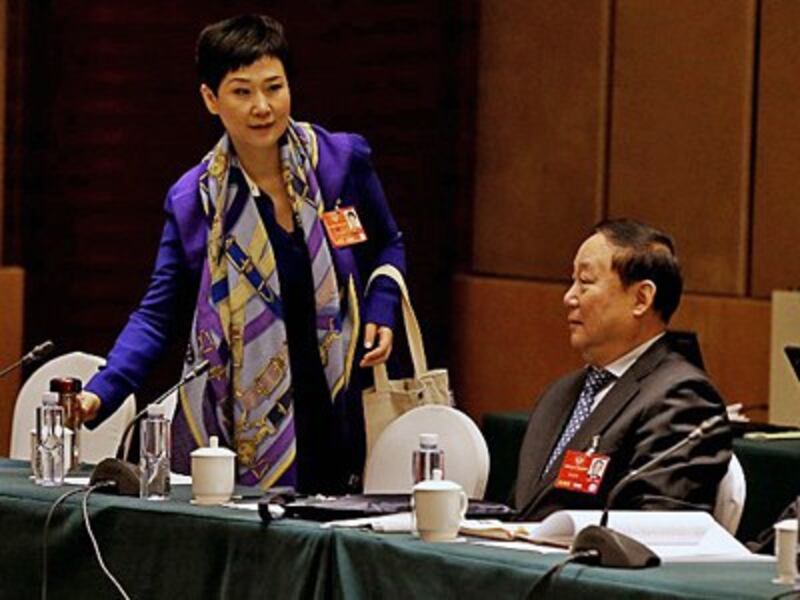China's powerful propaganda ministry has ordered all media outlets to delete any reports on the Panama Papers, a massive leak of confidential files that revealed widespread use of offshore tax havens by political leaders worldwide, including some relatives of high-ranking Chinese leaders.
"Find and delete reprinted reports on the Panama Papers," a leaked provincial propaganda directive published and translated by the U.S.-based China Digital Times (CDT) website said. "Please act immediately."
"Do not follow up on related content, no exceptions," the April 4 directive, delivered verbally to news editors across China, said.
"If material from foreign media attacking China is found on any website, it will be dealt with severely," it said.
A less stringent take-down order was issued targeting the reporting of Russian President Vladimir Putin's link to the documents leaked from Panamanian law firm Mossack Fonseca, according to CDT, which runs an archive of such notices titled "Ministry of Truth."
"Please withdraw the article 'Panama Papers Leaked, Putin in U.S. $200 Million Money Laundering Scandal' and related stories from [all] homepages and [social media], and move articles to the backend of the site," the notice, also dated April 4, said.
Scant discussion
But while the revelations have sent shock waves through the rest of the world's media, there was scant discussion of the leaks in China on Tuesday after censors removed all reference to the story across the Chinese Internet.
A Chinese journalist who gave only his surname Wu said it's now not possible to view news reports on the Panama Papers without using circumvention tools to get around the system of blocks and filters known as the Great Firewall.
"No, we can't see anything about this in China right now," Wu said. "It has all been deleted; it's all gone."
He said posts on forums, QQ chat groups, Twitter-like Weibo services and the popular messaging app WeChat were all being deleted if they mentioned the Panama Papers.
"Some people are still passing around screenshots of stories as images to their friends, however," Wu added.
At least eight current or former members of the all-powerful Politburo standing committee are among the more than 140 political figures worldwide linked to the offshore tax havens, according to a global investigation by the International Consortium of Investigative Journalists (ICIJ), the German newspaper Süddeutsche Zeitung and more than 100 other news organizations.
The ICIJ's website carrying details of the leaks was blocked in China on Tuesday, according to the anti-censorship website GreatFirewall.org.
Included in the names uncovered by the investigation are the brother-in-law of Chinese President Xi Jinping, Deng Jiagui, and the daughter of late former premier Li Peng, Li Xiaolin.
According to the examination of some 11.5 million documents, Deng set up two British Virgin Islands companies in 2009, while Li and her husband Liu Zhiyuan were the beneficiaries of “Foundation Silo,” a Lichtenstein foundation that was the sole shareholder of “Cofic Investments Ltd.,” a company incorporated in the British Virgin Islands during Li Peng's tenure as premier.

Highly sensitive
Wu said the leaks are highly sensitive, as they potentially implicate some of the highest-ranking leaders of the ruling Chinese Communist Party.
"This goes to the highest level ... A lot of people do know about this, but there are still many who don't know anything about it," he said.
"Netease and Tencent both had stories about it, but they only spoke about the overseas aspects, because on the first day it was mostly about Putin," he said.
"It wasn't until day two that reports started to emerge gradually about China's highest-ranking leaders, but ... now all reports about the Panama Papers have been banned," he said.
A worker in the legal profession surnamed Zhang said there was now a nationwide silence on the topic.
"These voices aren't being heard in China. Why? Because China has the Great Firewall," he said.
"There was a directive that nobody was to post anything on this topic, and, it pains me to say it, but that's actually what happened," he said.
Meanwhile, official Chinese media said the Mossack Fonseca leak was likely the work of "powerful forces" targeting "non-Western political elites."
The tabloid Global Times, which has close ties to the ruling party, said "the power behind the leak" is engaging a campaign of disinformation with an ideological aim.
"In the Internet era, disinformation ... will become a new means for the ideology-allied Western nations to strike a blow to non-Western political elites and key organizations," the paper said.
"The Western media has taken control of the interpretation each time there has been such a document dump, and Washington has demonstrated particular influence in it," it said, adding that leaks of documents by former NSA [U.S. National Security Agency] contractor Edward Snowden appeared to be "the most credible."
‘Groundless accusations’
Asked on Tuesday if Beijing would launch an investigation into the tax affairs of those named by the ICIJ, Chinese foreign ministry spokesman Hong Lei said the ministry would not comment on "these groundless accusations."
Freedom of speech activist Wu Bin said the government now has a stranglehold on information in China.
"There is no freedom of expression in China, and the only news that gets widely disseminated is news that is in [the government's] interest," Wu Bin told RFA. "It's wall-to-wall trivia, like [President] Xi Jinping eating dumplings, tiny things like that which get huge articles written about them."
"They believe that they can orchestrate the main theme tune and broadcast positive energy to the nation, and any news that isn't in their interest just becomes a wall of silence; it's not even mentioned," he said.
Reported by Wong Siu-san and Chan Siu-po for RFA's Cantonese Service, and by Yang Fan for the Mandarin Service. Translated and written in English by Luisetta Mudie.
